
Make Your Own Bourbon Workshop at Dragon Distillery
by
Terry Sullivan
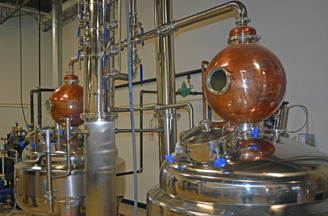 After learning to distill wine into brandy, I was quite interested in learning how to make bourbon. Dragon Distillery in Frederick, Maryland conducts bourbon making workshops. Kathy and I attended a workshop at the distillery and enjoyed the hands on workshop. You need to register and pay for the workshop in advance. Included in the fee is a liter barrel and one 750 ml bottle of moonshine that you take home and age in the barrel. The moonshine is made with 83% corn and 17% barley.
After learning to distill wine into brandy, I was quite interested in learning how to make bourbon. Dragon Distillery in Frederick, Maryland conducts bourbon making workshops. Kathy and I attended a workshop at the distillery and enjoyed the hands on workshop. You need to register and pay for the workshop in advance. Included in the fee is a liter barrel and one 750 ml bottle of moonshine that you take home and age in the barrel. The moonshine is made with 83% corn and 17% barley.
We assembled in the tasting room at Dragon Distillery on a cold December morning. Mark T. Lambert is the owner of the distillery and was our presenter during the workshop. Mark has quite a distilling past. His great grandfather and grandfather were moonshiners. Mark visited distilleries, took distilling classes and worked at a distillery prior to starting Dragon Distillery. After the eight of us in the group assembled, Mark led us into the production area. He gave a brief tour of the production areas and then we sat at tables while Mark began the slide presentation.
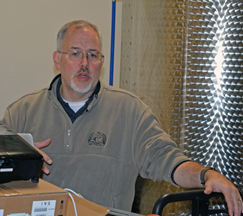 The workshop agenda included:
The workshop agenda included:
Introduction and safety
Let’s jump right in and mash
Distillery terms
What is bourbon
How bourbon is made
Mashing details
Barrel seasoning
Adding malted barley
Conclusion
This was a one-day, three-hour workshop. Those who are interested can take a two-day or three-day workshop. In addition, the two-day workshop includes:
Boiler operation
Still operation
The three-day workshop also includes
Spirit filtration
Proofing
Bottling
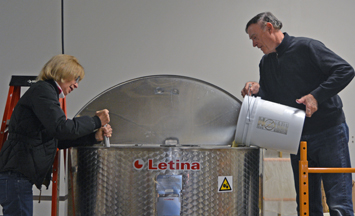 Mark talked to the group about Dragon Distillery and the importance of safety in the distillery. A few minutes after he started the presentation, we had our first hands on activity. We proceeded to a mash tank. Mark and his assistant demonstrated how to add yellow corn meal to the hot water already in the tank. While the corn meal was being added, a second person stirs the mixture with a whisk staying away from the propeller-like stirrer in the center of the tank. Then the group partnered up and had a chance to add corn meal and stir. We were instructed to add the meal slowly so that it would not clump. After this hands on task, we proceeded back to the presentation area.
Mark talked to the group about Dragon Distillery and the importance of safety in the distillery. A few minutes after he started the presentation, we had our first hands on activity. We proceeded to a mash tank. Mark and his assistant demonstrated how to add yellow corn meal to the hot water already in the tank. While the corn meal was being added, a second person stirs the mixture with a whisk staying away from the propeller-like stirrer in the center of the tank. Then the group partnered up and had a chance to add corn meal and stir. We were instructed to add the meal slowly so that it would not clump. After this hands on task, we proceeded back to the presentation area.
Mark discussed common distillery terms. He then did an overview of fermentation, distillation, filtration, proofing, aging and bottling. During this section, we walked over to the still where Mark gave detailed information about the distilling process. He talked about the boiler and the parts of the still. He mentioned the different alcohols that evaporate at different temperatures. He also mentioned the different chambers of the columns and the pots.
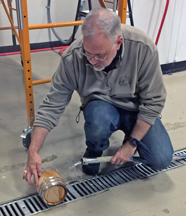 After the still presentation, we took our barrels to Mark and he poured very hot water into them from a hose. He explained that the hot water would cause the wood to expand and seal the barrel. It would take about one hour for the wood in the small barrels to expand and seal. Mark offered the group an opportunity to fill the barrels even though the water was very hot. We all let Mark do it.
After the still presentation, we took our barrels to Mark and he poured very hot water into them from a hose. He explained that the hot water would cause the wood to expand and seal the barrel. It would take about one hour for the wood in the small barrels to expand and seal. Mark offered the group an opportunity to fill the barrels even though the water was very hot. We all let Mark do it.
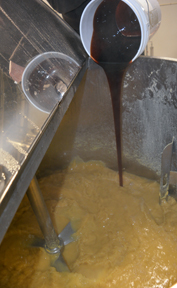 Back at our instructional area, Mark delved into the importance of mashing. We learned many details about this stage including gelatinization, liquefaction and saccharification. At this point we returned to the mash tank where a couple of people added liquid malted barley to the mash mixture. After observing the mash tank, we observed two other tanks. One tank had the solid residue left over after fermentation and the fermented liquid substance was transferred to the still. The other tank had mash just near the end of fermenting stage.
Back at our instructional area, Mark delved into the importance of mashing. We learned many details about this stage including gelatinization, liquefaction and saccharification. At this point we returned to the mash tank where a couple of people added liquid malted barley to the mash mixture. After observing the mash tank, we observed two other tanks. One tank had the solid residue left over after fermentation and the fermented liquid substance was transferred to the still. The other tank had mash just near the end of fermenting stage.
Our next learning slides covered an overview of filtration, proofing and the TTB. Mark talked a bit about the barrels and retrieved a couple samples from barrels for us to taste. The Rye Whiskey, made in collaboration with Flying Dog Brewery, was at barrel strength,125 proof (62.5% alcohol). The Fear of the Dragon was also a barrel strength spirit at 125 proof. The spirit was made from pumpkin beer. Prior to bottling, both spirits will be cut to around 90 proof. Mark also adds flavors to some of the spirits by immersing a nylon bag filled with peppermint, or other flavoring items into the tanks.
We then tasted several Dragon distillery products including, rum, vodka, moonshine and a gin. In the tasting room, visitors can purchase a variety of spirits for their enjoyment at home.
No prior distilling knowledge is required to take the workshop. It is appropriate for any distilled spirits enthusiasts who may want to know a bit more about how to make distilled products. Mark had a nice mixture of presentation and activities. We enjoyed his presentation.
Dragon Distillery, LLC
1341 Hughes Ford Rd
Suite 108
Frederick, Maryland 21701
GPS: N39º 24.967’ W77º 22.874’
Article written December 2016
